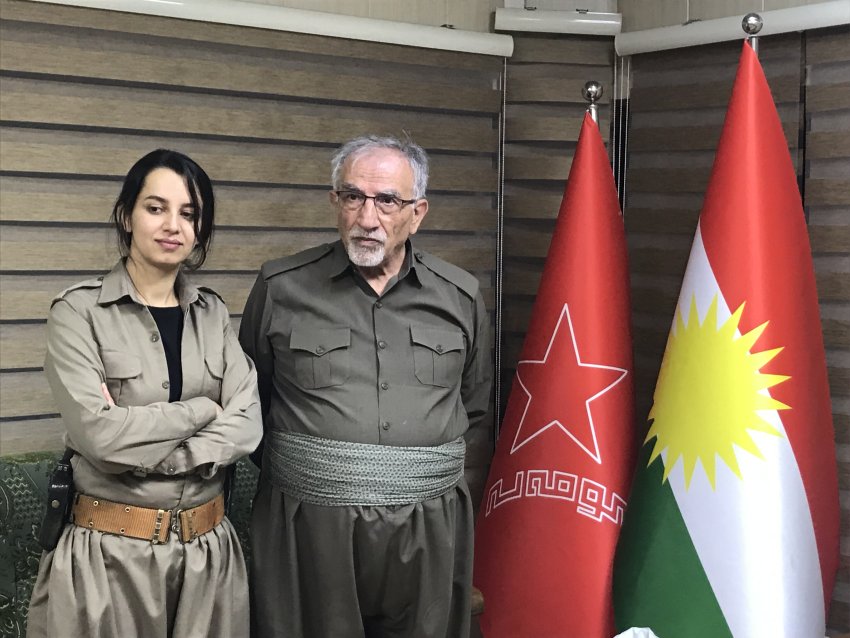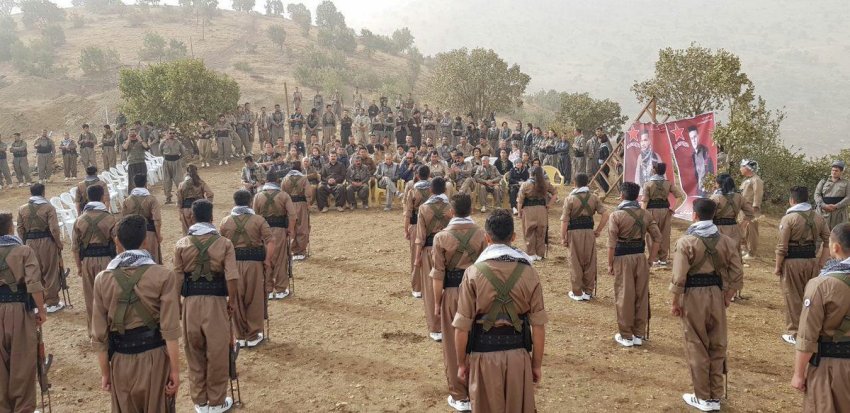
In recent weeks, attacks on Kurdistan have intensified.
Some have made international headlines, such as Turkey’s bombardment of a resort in the Iraqi Kurdish town of Zakho on July 20, which killed nine and injured 33. There has also been speculation of a new Turkish military invasion of Rojava, or Syrian Kurdistan, causing concern about a possible deterioration of the security situation across the whole of the region.
However, little has been written in the Western press about developments concerning the part of Kurdish soil often forgotten — that of Rojhelat, or Iranian Kurdistan. Over the past few weeks, there has been a renewed push by Iran’s clerical regime to tie the Kurdish resistance to foreign powers, namely Israel.
These accusations have come after Iran’s security institutions first reported the arrest of ten people in late July. This news happened to coincide with the ambushing of four members of the Komala Party of Iranian Kurdistan in Urmia, a city in the West Azerbaijan province.
Iran’s Intelligence Ministry rushed to link the Kurdish rebels to an international conspiracy, proclaiming: “A network of Mossad elements, which penetrated Iran from the Kurdistan region to engage in terrorist and sabotage operations in sensitive centers in Iran … were arrested.”
Roots in Iran's socialist movement
Komala is a leftist organisation that dates back to 1969, originally taking its place in the resistance against the Shah. As a Kurdish component part of an Iranian-wide socialist movement, it participated enthusiastically in the 1979 revolution, and then waged a protracted struggle against the establishment of an Islamic Republic. Komala would continue to engage in combat with Ayatollah Khomenini’s forces throughout the 1980s.
However, over the past several decades, Komala has largely operated from territory inside Iraqi Kurdistan. From there, it continues to train and graduate new Peshmerga military recruits, although it claims this is for the purpose of self-defense rather than offensive warfare against the Iranian state.
When I visited Komala’s headquarters last year, they were keen to point out that although Peshmerga are often deployed on missions inside Iranian Kurdistan, these have an agitational rather than a military basis. For instance, distributing literature to Kurdish villagers is considered an important task.
Siamak Modarresi, Komala’s Deputy Secretary General, made clear that this was the case with the latest arrest of Komala members, saying: “They were unarmed, without any weapons. Their mission was not of any sort of a military character. They were on the way to contact people inside Iran to organise them. These kinds of missions are very common in our party. We’ve been in touch with our people inside Iran mainly like this for decades.”
The Islamic Republic, however, presented photos of square-shaped furniture it said was captured from the Komala detainees that had guns and explosives hidden inside. They alleged that the purpose of their mission was to "bomb a sensitive defence industry centre in the country” and that the planning was coordinated by Israel’s Mossad.
The accusation that Komala is acting as a “proxy of the Zionist regime”, as Iran’s intelligence ministry has put it, is nothing new. According to Modarresi, these assertions go back decades to the very foundation of the Islamic Republic.
“Since their very first month as rulers of Iran, they accused all their opponents of being foreign collaborators and agents. They have tried to make such confessions by torture. In nearly all cases, the people who confessed later retracted these confessions after they reached a safe haven in other countries.”
The claim of Komala being an agent of foreign powers certainly has many historical parallels. In fact, alleging revolutionaries to be a “fifth column” working on behalf of an external enemy appears to be one of the oldest tricks in the political handbook.
During the Cold War era in the United States, socialists and communists were accused of having their strings pulled by the Soviet Union. Today, those who seek to criticise the North Atlantic Treaty Organization in the West are branded as Russian agents. Even Russian revolutionary Vladimir Lenin was labelled as an agent of the German Empire rather than someone with sincere motivations rooted in the working-class struggle.
In all cases, the objective is to delegitimise the actual rationale behind the social movements or causes in question. Indeed, if Kurdish militants are nothing but pawns of Israel, there is no need to address the national oppression faced by Kurds in Iran, who suffer from disproportionate poverty and unemployment, not to mention widespread executions.
In fact, the Iranian state refuses to brand Komala as anything other than “separatists”, even though the most elementary look at their positions clearly indicates that they favour a democratic and federal Iran, not independence for the Kurdistan province. This is most clearly manifested in Komala’s participation in the Congress of Nationalities for a Federal Iran, which includes organisations from other oppressed components inside the country such as the Baloch, Azeri and Ahwazi.
For Komala, there is concern that Iran is gearing up for what it will present as retribution against the party. Modarresi says this is something he is certain of, although “how and to what extent remains to be seen in the future”.
Iran has also said that it will hold others accountable, including the Iraqi Kurdish administration that hosts Komala. The Islamic Revolutionary Guard Corps Cyber Force warned on July 28 that “punishing the aggressors is on the agenda, because the redlines of Iran’s national security were crossed, planned by Mossad, executed by terrorist groups based in the Iraqi Kurdistan region, and aided by the Iraqi Kurdistan leadership”.
357 - komala cr @Komala_english on twitter.jpg

Repression
Iran has executed several Komala members, as well as those accused of membership, in recent years. In one fairly high-profile case in 2018, the Iranian authorities hung Ramin Hossein Panahi, even after an international outcry that presented his case as littered with human rights abuses from the time of his arrest the previous year.
During these difficult times, what Modarresi considers to be vital is the solidarity of progressive people across the world. “They can do a lot,” he says. “They can contact the human rights authorities and demand that they support the Kurds of Iran — and especially that they are able to access the arrested and prevent them from being tortured, so that there can be a fair trial for them.”
Despite the ongoing threats, the Komala Party seems largely undeterred by the latest accusations that have been leveled at them, posting new photos on numerous social media accounts of the latest graduation ceremony of Peshmerga recruits at their headquarters.
As Modarresi puts it: “We are very popular among people. Komala has found roots more and more especially among the young people. This is perhaps one of the reasons for the regime's sensitivity and attitude towards us.”
[Marcel Cartier is a critically acclaimed hip-hop artist, journalist and author, whose work has appeared in the Morning Star, Green Left, TeleSUR, and Kurdish Question. His book Serkeftin: A Narrative of the Rojava Revolution (2019) was one of the first major accounts in English of the structures set up in northern Syria by the Kurdish forces.]